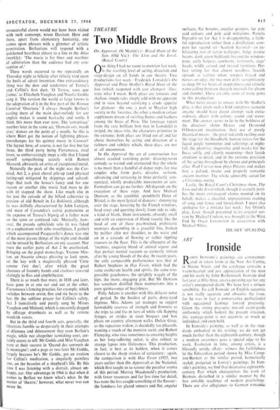THEATRE
Two Middle Brows
On Approval. (St Martin's.)—Royal Hunt of the Sun. (Old Vic.)—The Lion and the Jewel. (Royal Court.) ONE thing I had no room to mention last week is the startling level of acting, direction and stage-design on all hands in our theatre. Two productions last week—Frederick Lonsdale's On Approval and Peter Shaffer's Royal Hunt of the Sun (which reopened with cast changes)--illus- trate what I mean. Both plays are tenuous and shallow, simple tales simply told with no apparent end in view beyond satisfying a crude appetite for glamour—the one, a peek at Mayfair high society in the 'twenties, the other a modern colour supplement dream of swirling flames and feathers among the Incas of Peru. The language (apart from the rare brilliant bon mot in Lonsdale) is insipid, the ideas trite, the characters primitive in the extreme; both plays are lifted out of and far above themselves by acting and direction of a richness and subtlety which, these days, are not at all uncommon.
In On Approval the art of construction has almost reached vanishing point—drawing-room comedy so wasted and attenuated that the whole is no more than a handful of dance steps, for two couples who form pairs, dissolve, re-form, advancing and retreating in three perfectly sym- metrical, wholly predictable movements or acts. Formalism can go no further. All depends on the execution of these steps. And here Michael Denison, as the youthful, spendthrift Duke of Bristol, is the most lyrical of dancers: shimmying over the stage, hovering by the French windows, head erect and questing slowly from side to side, a kind of blank, blunt instrument, absurdly small and with an expression of bland vacuity like the head of one of those pea-brained, prehistoric monsters descending in a graceful line, broken by neither chin nor shoulder, to the waist and on in a cascade of flowing or rather rippling trousers to the floor. This is the silhouette of the 'twenties, exquisite blend of animal vigour and that perfect mental vacuum so earnestly striven after by young bloods of the day. In recent years, the only comparable performance was that of Robert Stephens in Hay Fever, which had the same exuberant health and spirits, the same irre- pressible gaucheness, the sprightly waggle of the hips, the inane, engaging grin. But Mr Denison has somehow distilled these mannerisms into a pure quintessence of boyishness.
Polly Adams is another with this delicate sense of period. In the hardest of parts, dewy-eyed ingenue, Miss Adams yet manages to suggest formidable reserves of strength and firmness as she trips to and fro in tiers of white silk flapping fringes, or strides in stout brogues and box pleats on country afternoon walks. Dulcie Gray, as the rapacious widow, is decidedly too pleasant, wanting a touch of the monstre sacre, and Robert Flemying, who rises sometimes to amazing heights as her long-suffering suitor, is also subject to strange lapses into lifelessness. This production, in fact, is best at its boldest, when it comes closest to the sharp strokes of caricature: again, the comparison is with Hay Fever (1925, two years earlier than On Approval) at the National, which first taught us to savour the peculiar aroma of this period. Murray Macdonald's production, with fewer resources and far less time for detail, has none the less caught something of the flavour: the fondness for glazed veneers and flat, angular surfaces, flat bosoms, angular gestures, for pale acid colours and pale acid witticisms. Pamela Ingram's set for Act 1 is disappointing, a faith- ful reproduction rather than a distillation; com- pare her second set—Scottish baronial—an ex- hilarating riot of tartan wallpaper, bulgy granite beams, dank green highlands beyond the window- pane, curly hatpegs, cowhorns, footstools, stags' heads, wildly carved and twisted furniture. Per- fect setting for that almost wordless, liverish episode at teatime when, tempers frayed and nerves on edge, the two men drift surreptitiously to sleep. Or for bouts of snappishness and vitriolic name-calling between sluggish intervals for gloom and slumber. These arc only some of many gems in this production.
What never ceases to amaze, with Mr Shaffer's play, is that given such a bald and prosy scenario anyone should have dared attempt such extra- ordinary effects with colour, sound and move- ment. The answer seems to lie in the boldness of the directors' (John Dexter and Desmond O'Donovan) imagination, their use of purely theatrical means—the great red cloth rustling over the stage for the bloodbath, human voices for the liquid jungle hummings and schirrings at night- fall, the plaintive, inquisitive gold masks for the Incas softly and silently mourning—their lavish attention to detail, and in the extreme precision of the acting throughout by chorus and principals alike. Paul Curran now plays Pizarro and makes him a palsied, insane and properly romantic ancient mariner. The whole admirably suited for a Christmas outing.
Lastly, the Royal Court's Christmas show, The Lion and the Jewel which, though it scarcely justi- fies the more extravagant claims mooted on its behalf, makes a cheerful, unpretentious evening of song and dance and knockabout. I must also apologise for a mistake last week : Joe Orton's play, Loot, though presented in its original ver- sion by Michael Codron, was brought to the West End by Oscar Lowenstein in association with Michael White.
HILARY SPURLING






























 Previous page
Previous page